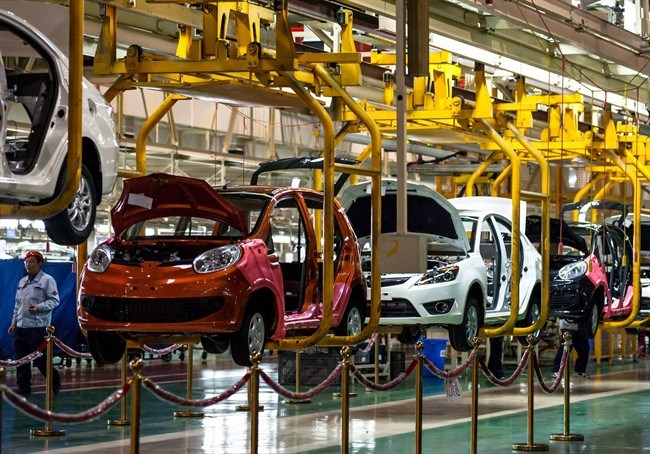OTTAWA — Stephen Harper was under fire Friday for a debate remark the previous evening in which he predicted the auto sector may not like the outcome of the Trans-Pacific Partnership talks.
The Liberal and NDP leaders pounced on the Conservative leader, who has placed trade deals at heart of his economic agenda.
Justin Trudeau said Harper needed to be more forthcoming to Canadians about the opaque trade talks, a frequent complaint by critics of the 12-country negotiations.
Tom Mulcair cited the remark as further evidence that Harper’s policies have harmed the auto and manufacturing sectors, leading to hundreds of thousands job losses.
But it was the head of Unifor, which bills itself as Canada’s largest private-sector union, that had the most scathing critique of Harper.
“It just blew us out of the water. You’ve got Ed Fast, the trade minister, saying that he’s not signing a trade deal that’s going to negatively impact the auto industry, and you have Harper saying just the opposite,” said Unifor President Jerry Dias.
“We are obviously nervous.”
Harper raised the issue during the Thursday night leaders’ debate in Calgary, saying the auto sector may not like everything in the agreement, but Canada can’t afford to be out of the pact.
The Harper government says the TPP is crucial to Canada’s economic future, noting that it would encompass 40 per cent of the world’s combined gross domestic product.
A new round of talks last month in Hawaii failed to bring about an agreement.
Dias said Harper’s insistence — reiterated in Thursday’s debate — that Canada must reach an agreement on the TPP has undermined Canada’s bargaining position because it makes the country look too eager.
“Harper is the world’s most incompetent negotiator,” said Dias.
“He just told Japan and the United States, ‘Do whatever it is you wish, because I need a deal under any circumstances because of this federal election.’ He threw in the towel.”
Trudeau said it was irresponsible that Harper “randomly” raised the auto sector during a leaders’ debate, and that it underscores the closed-door nature of the talks.
“Canadians need to have confidence that their government is being honest with them, being open and transparent about the kinds of issues that we’re going to have to make possible concessions about.”
Mulcair said it was one more example of how Harper’s policies have hurt the manufacturing sector, costing it 400,000 jobs.
Mulcair also accused Harper of selling out dairy and poultry farmers in Ontario and Quebec for not adequately protecting supply management from the demands of TPP members Australia and New Zealand.
The auto sector is also contentious because of a TPP proposal that could soften the so-called rules of origin requirements, permitting Japan to export vehicles to North America with fewer parts actually made in Canada, the United States and Mexico.
Mark Nantais, the president of the Canadian Vehicle Manufacturers’ Association, said Canada needs to get on the same page as the United States because it is in the middle of its own talks with Japan on autos.
Canada, U.S. and Mexico need to present a united front to other TPP countries, Japan especially, on a schedule to phase out tariffs in the auto sector, he added.
“It all comes back to the integration of our industry. That’s what’s so important to future of our assembly here, and future investment,” he said.
“The assembly plants are what anchors everything else, primarily the supply chain in Canada.”
Trade lawyer Lawrence Herman, of Herman and Associates, said Harper’s comments are a sign that “Canadian auto and parts manufacturers will certainly be getting less in the TPP than what they got in NAFTA,” the North American Free Trade Agreement.



